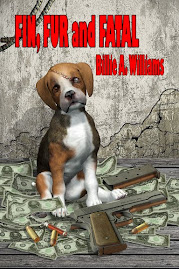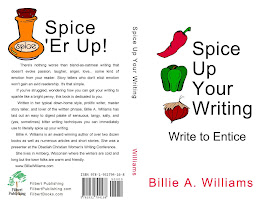Create a Movie in Your Reader's Mind
By Billie A Williams
While I was re-reading some material on script writing this morning I came upon some very interesting information that I wanted to share with you. You know how everyone tells a writer, show don't tell, how they say don't use weasel words - make your nouns and verbs strong enough to stand the test without the anchors that drag your story down. Well here are some great examples -- and a quote from the movie Finding Forrester
"No thinking--that comes later. You must write your first draft with your heart. You rewrite with your head. The first key to writing is...to write, not to think!"
That's exactly it about the first draft of your story, novel, or poem too--you really do need to just dump it all down onto the page and worry about the exact wording later. Look at this from "The Longest Night, by Eric Heisserer "...Gormand, as oily and wrinkled as a gas station dollar bill..."and farther along..." Bundled against the cold." ...A sign welcomes him to Barrow, Alaska the most northern town in the USA..."A mote of civilization on the ass of Old Man Winter." "...an orange smear of a sun slowly collapses on the horizon." You can almost feel the chill following that orange smear.
How colorful, how powerful -- you can visualize what this man is seeing so clearly - in your writing, this is what you want to emulate. Not flowery, adverb and adjective cluttered, cliche riddled writing, but clear, concise, decisive writing.
How about this phrase "he's a pit bull with a badge". You know immediately what this fella looks and acts like don't you? Reading the works of the masters will show you the way to make your writing that true. Take note too, that writing is genre specific. The way you say something in a romance novel is not the way you would say it in a thriller or horror story. Try describing a sunset or a sunrise in both. If you use it to create a mood for that story – you know you will have totally incongruent descriptions or at least you should. Colorful, dreamy, feel good sunrise:
Let’s try it. Lavender threads pulled the sun leisurely to the horizon as a mist settled over the valley. Angelica stirred and realized a body shared her bed and this early morning, she smiled and reached out to place a hand on Spade’s shoulder. [Romance]
Foreboding, expectant: Lavender streaks spiked across the sky interrupting the orange glow slashing through the pre-dawn. Angelica stirred and realized a body shared her bed, panic instantly knotted her insides. She slowly reached to pull the sheets tightly around her as Spade’s broad shoulders were silhouetted in the light sneaking through the sliding glass patio doors. A heavy haze cloaked the landscape giving it a surreal look as she slipped quietly from the bed trying not to disturb him. [Suspense]
I’m visualizing the same morning through the same window and sunrise – but from different plans for a story. Romance and then suspense/horror. Can you feel the difference?
When you work to rewrite your story, do it from several passes through the work. Don’t try to do it all at once. Check the format – is it properly put together. Then check the story, is there continuity, does it flow, is it cohesive, are there places where the flow is interrupted that you can smooth out. Can you make better transitions; get us from one place to another better?
Next take a look at your characters. Can you tell them apart? Do they have their own idiosyncrasies, their own language that helps the reader keep the players straight? Do they stay true to character? Does their dialogue lead you forward – cut any useless, word-padding verbiage?
Now read through for a look see at your action. Is it moving the story forward at a good pace—do you race where you should and pause where the reader needs to take a breath? The pause can be narrative, a reflective paragraph or two, a hint of comedy to lighten tenseness. Keep in mind your reader cannot remain on an concentrated, highly-charged peak indefinitely—he needs some relief for your story to continue to be page turning. Too much suspense, too much romance, too much of anything bogs the story down. Your reader will close the book never to return or throw it against a wall vowing never to pick up a book by this author again.
While you are doing these pass throughs is the time to tweak the words so they say exactly what you mean, exactly the emotion, the feel, the sentiment you want to leave your reader with. As film producers will tell you, it’s the last 20 – 30 minutes that makes the movie memorable — so too should your last 20 - 30 pages be your memorable ones. Send you reader off satisfied and waiting for your next novel, short story or poem....or script.
=====================================================================
Feel free to share this article with your list, friends, or whoever as long as you leave this resource box attached. Thank You!
Billie A Williams is a Mystery Suspense author, but she also writes in other genres you will find her work at http://www.billiewilliams.com/ or her blog http://printedwords.blogspot.com/ or the writers group she owns http://www.word-mage.com/ . You can send her an email at billie@billiewilliams.com
Wednesday's Words for December 4, 2019
6 years ago











1 comment:
Very good article, Billie. Writing without editing as I go is close to impossible for me to do. I suppose I'll have to practice it. At least, chapter by chapter.
Thanks for sharing.
Pee Wee
Post a Comment